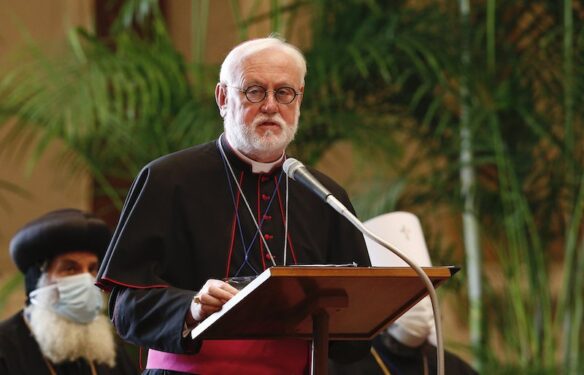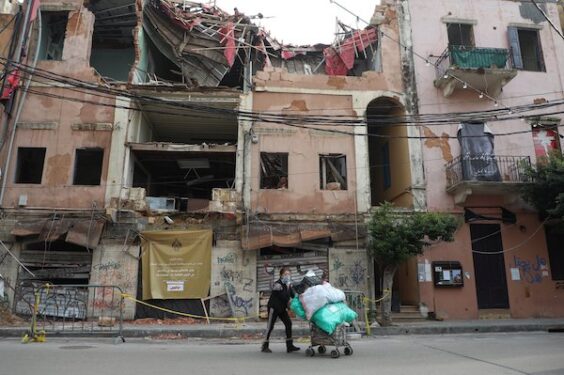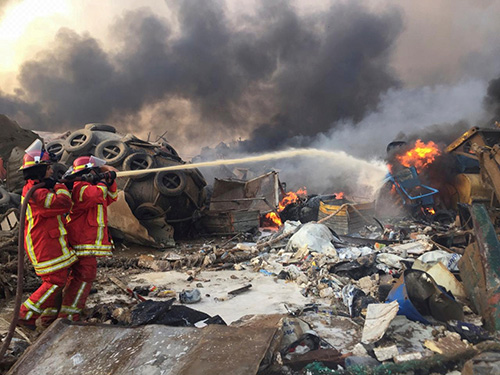By Elise Ann Allen, Senior Correspondent
ROME (Crux) — On Monday, British Archbishop Paul Gallagher began a five-day trip to Lebanon that will have political, ecclesial, and pastoral implications as the country struggles to overcome a crippling financial and social crisis.

The Holy See’s Secretary for Relations with States arrived in the Middle Eastern country on Monday and will stay until Feb. 4, meeting with top political and religious leaders, and paying visits to migrants and the impoverished.
He is set to meet with several top statesmen during the visit, including Lebanese President Michel Aoun; Prime Minister Najib Mikati; President of Lebanese Parliament Nabih Berry; and Minister of Foreign Affairs Abdullah Bou Habib.
Since late 2019, Lebanon has been in a financial freefall that has rapidly worsened, and which has been compounded by the coronavirus pandemic and a massive explosion at the port of Beirut in 2020.
In just two years, tens of thousands of people have lost their jobs and the Lebanese pound has lost more than 90% of its value as a result of the crisis, largely rooted in decades of mismanagement and corruption.
Meanwhile, poverty rates have soared, with the United Nations estimating that some 78% of citizens live below the poverty line, with 36% living in extreme poverty.
Social unrest has also grown amid the government’s inability to resolve the issue, largely due to political disputes and lengthy stalemates between parties.
As politicians continue to circle on a political merry-go-round, a 15-year alliance between Lebanon’s influential Shiite Hezbollah group and the Free Patriotic Movement, which is Lebanon’s largest Christian party, is now potentially at risk.

Struck in 2006, the alliance has widely been credited with helping to maintain peace in the small, yet ethnically and religiously diverse nation, cementing Lebanon’s status as a place of interreligious tolerance.
However, should that alliance collapse, the future of Lebanon’s Christian minority could also be threatened.
While some politicians have voiced confidence that the alliance will hold, Lebanon’s political process has been thrown further into crisis in recent days with the announcement that three time-former prime minister Saad al-Hariri, Lebanon’s leading Sunni Muslim politician, would boycott the May general election, during which a new parliament and president will be elected.
Saad’s boycott came as an unexpected and major blow that threatens an imbalance in the religious representation within parliament, and while Aoun and other politicians have said the elections are on schedule as normal, the situation is far from clear.
Tensions are also increasing between citizens struggling to get by and the roughly 1.5 million Syrian refugees in Lebanon, with some fearing that a violent conflict could break out that is reminiscent of Lebanon’s Civil War, caused largely by tensions with Palestinian refugees.
As with the Palestinians, most of the Syrian refugees are Muslim, which has shifted the religious demographics of Lebanon and has left some Christians feeling crowded and fearful of their long-term fate.
Lebanon, widely recognized as an icon of interreligious tolerance in the Middle East, is seen by many as Christianity’s best fighting chance in the region, meaning that if Lebanon collapses, Middle Eastern Christianity could suffer too.
Because of this, Archbishop Gallagher’s visit will also be an opportunity to cement interreligious ties.
While in Lebanon, he is set to meet with the Grand Mufti of Lebanon Sheikh Abdul Latif Derian; the vice president of Lebanon’s Higher Islamic Shiite Council, Sheikh Ali Al Khalil; and the Sheikh Al-Aql of the Druze Community, Sheikh Sami Abi Al Mouna.
His visit will also have a pastoral tone and includes several meetings with Catholic and Orthodox patriarchs and bishops.
Although the list of Archbishop Gallagher’s appointments didn’t specify who these leaders are, one will certainly be Cardinal Patriarch Bechara Boutros Raï, head of the Maronites, who has been an outspoken voice amid Lebanon’s crisis, encouraging the political process, criticizing stalls, and warning against the postponement of May’s elections.
Archbishop Gallagher is also slated to attend the opening of the “John Paul II and Lebanon” symposium organized by the Holy Spirit University of Kaslik, and he is scheduled to visit the site of the Beirut port explosion as well as migrant camps.
He will meet with young people and those in need, providing some much-needed pastoral support and conveying Pope Francis’s own closeness and interest in the situation.
It is widely believed that this visit could also be a scouting mission, of sorts, for a future visit from Pope Francis, who has often voiced his desire to visit Lebanon himself when conditions allow.
This visit is the latest Archbishop Gallagher has made on behalf of the pope to nations of keen papal interest, following a December visit to South Sudan.

